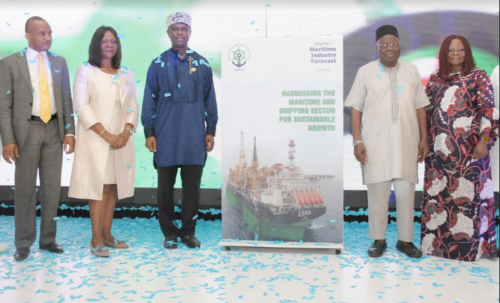
The Nigerian maritime industry has been projected to grow by 10 percent within the next two years.
This was contained in the Nigerian Maritime Industry Forecast covering the period 2019/2020, unveiled in Lagos on Tuesday by the Director-General of NIMASA, Dakuku Peterside.
Peterside, who stated that the industry would witness increase demand in shipping business in the period under review, however noted some down- sides to the expected performance, which include the outcome of the 2019 general- elections and concerns about the global economy.
He said, “This year’s forecast predicts that the maritime sector has the potentials of contributing at least 10 percent of Nigeria’s GDP in no distant future as Nigeria has the biggest market in Africa and generates about 65 to 67 percent of cargo through put in West and Central Africa and that about 65 percent of oil cargo heading for the region of West and Central Africa will most likely end in Nigerian market.
“The outlook for the economy’s performance in 2019 reflects, on the global side, concerns about a substantial economic growth slowdown, likely higher US interest rates, a stronger dollar and volatile oil prices (US$60pb), and the impact of sentiment surrounding the 2019 general elections and post electoral transition on the domestic side. If election ends in favour of the incumbent that means there will some consistency in policy but if election ends in favour of the opponents, there will be new shifts in terms of policies.”
According to the maritime forecast, the empirical analysis projects the growth of the total fleet size in 2019 over 2018 to be 10.33 percent, easing to 8.75 percent for 2020. Oil tanker fleet size is projected to decrease by 11.2 percent for both 2019 and recover to a positive growth of 0.11 percent by 2020.
The projection for non oil tanker fleet size is estimated to increase by 14.3 percent, in 2019 and 10.2 percent in 2020, while oil rig count is projected to increase by 6.98 percent and 6.5 percent for 2019 and 2020 respectively.
Speaking on effort to develop indigenous participation in the shipping sector, Dakuku said the agency is currently in talks with the Central Bank of Nigeria and the Finance Ministry to create a special intervention fund for the development of infrastructure in the sector.
According to him, asset acquisition and human capacity development are critical elements needed to enable Nigerian play major roles in the maritime and shipping sector.
“Shipping is capital intensive and the Cabotage Vessel Financing Fund (CVFF) is not adequate to address the huge demand for maritime assets. NIMASA is working with other stakeholders and we are looking at other ship financing models.
“We have had series of engagements with the CBN, Federal Ministry of Finance pushing for special intervention funds at special interest rate not more than a single digit interest rate and other incentives that will drive optimal performance in the sector. We shall not relent in our drive to put the right frame work together to help beneficiaries and investors have good return on investment,” he said.
He expressed hope that the forecast which focuses on harnessing the maritime and shipping sector for sustainable growth would propel the agency to create jobs and contribute more to the economy growth of the nation.
An economic analyst, Dr. Doyin Salami, in his analysis of the forecast said while the sector is progressing, it is still largely unexploited despite its huge potentials.
He said issues round regulations have greatly affected the sector, noting that the industry is still far below where it was before Nigeria went into recession in 2016.
